How to Start a Food Truck Business in Miami, FL
Florida is among the top ten states with the highest number of food truck businesses, alongside California and Texas. And within Florida, Miami stands out as a vibrant hub for food trucks, so if you're going to start a food truck business, Miami is the place to be.
Tauseeq Magsi
loading...
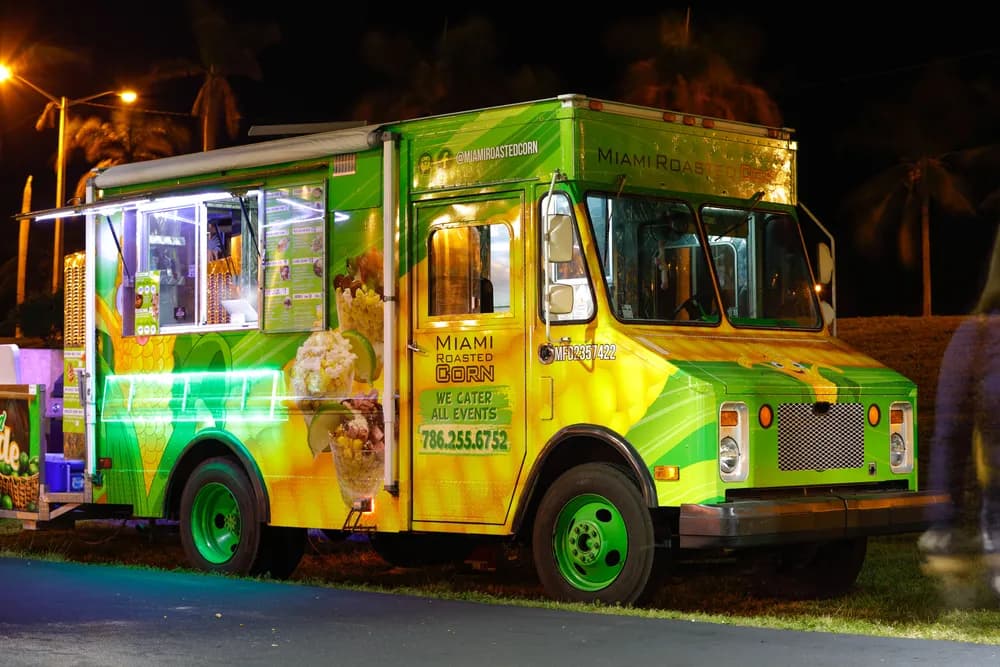
Miami is a food lover’s paradise, and food trucks are a huge part of the city’s dynamic culinary scene. From busy tourist areas to trendy neighborhoods, there’s no shortage of places to set up shop and serve delicious meals.
But before you get rolling, there’s a lot you need to know.
In this guide, we’ll walk you through everything you need to know about how to start a food truck business in Miami.
We’ll discuss every step of the process, from planning your business to getting the right permits and finding a spot to park your food truck.
By the end, you’ll have a clear picture of how to start a food truck in Miami and be on your way to making sales.

Why Miami?
Miami is one of the best places to start a food truck business. The city’s always buzzing with tourists and locals, and there’s a real love for diverse, delicious food.
The food truck Miami scene is growing fast, with trucks serving everything from tacos to gourmet burgers at events, festivals, and popular spots around town.
Did you know that Florida is among the top ten states with the highest number of food truck businesses, alongside California and Texas?
Up until 2023, Florida was home to 725 food truck businesses, making it a key player in the growing food truck market. Miami, being a major metropolitan area in Florida, plays a significant role in this market.
But while the opportunity is huge, it’s not without its challenges. The Miami food trucks market is pretty competitive, with many food trucks already established.
Plus, dealing with local rules, permits, and parking restrictions can be a bit of a headache. Another challenge is the weather—Miami’s heat and humidity can be tough on both you and your food truck. You’ll need to make sure your equipment is well-maintained and that your food truck is equipped to handle the hot and often rainy weather.
Still, if you're ready to put in the work, Miami offers great potential for a successful food truck business. The city’s love for food makes it the perfect place to share your unique flavors with a crowd.
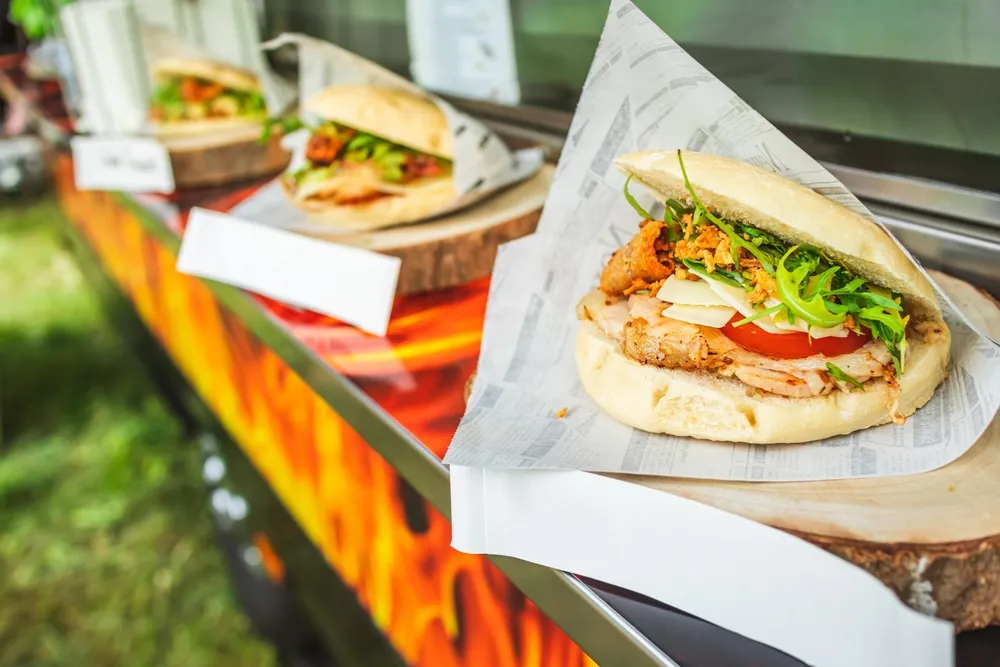
Step-by-Step Guide to Starting Your Food Truck in Miami
Getting your food truck up and running in Miami requires careful planning and preparation. Each step is important to make sure your business is legal, functional, and ready for customers.
Let’s walk through the key steps you’ll need to follow to get your food truck on the road and turn your food truck dreams into a reality.
Step 1: Start with a Solid Business Plan and Choose Your Structure
Before you acquire any permits or buy your food truck, you need a solid business plan. This will be the foundation for everything else.
Start by deciding what kind of food you want to serve. Think about your target audience—who are they? What makes your food truck different from others in Miami? This will help you stand out in this competitive market.
Along with your concept, you also need to choose your business structure. You can go with a sole proprietorship, which is a simple structure where you and the business are legally the same, meaning you're personally responsible for any debts or legal issues. Another option is a limited liability company (LLC), which protects your personal assets from business liabilities while allowing for pass-through taxation. You can also opt for a corporation, which is a separate legal entity from its owners, offering the highest level of liability protection but with more complex regulations and tax requirements.
Having a clear plan and the right structure will keep you on track as you move forward with the next steps of starting your food truck business.

Step 2: Obtain the Necessary Permits and Licenses
To legally operate your food truck in Miami, you’ll need to secure several essential permits and licenses.
Here's a breakdown of what's required, along with the fees:
1. Certificate of Use (CU)
This certificate ensures your food truck complies with Miami's zoning laws and site restrictions . It costs $75 and is renewable annually. To apply, submit a detailed outline of your business operations and service hours, along with a copy of your state food service license, to the Miami-Dade County City Hall office.
2. Mobile Food Permit
This permit is needed for mobile food businesses that sell pre-packaged foods or foods that aren't considered susceptible to immediate contamination. The fee is $347 per year, and the cost is determined during the initial inspection. You’ll need to complete a Commissary Letter of Agreement (if applicable) and submit a Food Establishment Inspection Application to the Florida Department of Agriculture and Consumer Services (FDACS). This permit must be renewed annually before December 31.
3. Business Tax Receipt
Also known as an Occupational License, this receipt is required for tax purposes. After obtaining your Certificate of Use, provide a copy of it along with your Federal Employer Identification Number (EIN) to the City of Miami. The exact fee varies based on your business, but you can find more details on the City of Miami's website.
4. State Agency License
If you plan to hire staff for your food truck, you'll need to obtain a State Agency License. The application fee for this license is $250. This license ensures that your staff is properly certified and that your food truck meets the necessary health and safety standards.
5. Mobile Food Dispensing Vehicle (MFDV) License
This license is required for mobile food establishments operating in Florida. The application fee is $50, and the license fee is $347 per year.

Step 3: Consider Financing Your Food Truck and Insurance Needs
Starting a food truck business requires a significant investment, so you'll probably need some form of financing. You have a few options here.
Small Business Loans, like those offered by the Small Business Administration (SBA) , are a popular choice for many food truck owners. Banks also provide small business loans, especially for food-related businesses, so that's worth considering. If you have a great food truck idea, crowdfunding through platforms like Kickstarter or GoFundMe can be a way to raise funds from people who believe in your concept.
Another option is using personal savings, but keep in mind this comes with more risk.

Along with financing, you’ll need to think about insurance. Running a food truck means dealing with potential risks, so insurance is a must. You’ll need liability insurance to protect against accidents, workers' compensation if you have employees, and vehicle insurance for your food truck. Some policies will even cover your equipment and food-related incidents.
Having the right insurance ensures you’re covered operating food trucks Miami, no matter what happens.
Step 4: Decide on Crew Size and Roles for Your Food Truck
If you’re planning to operate a busy truck, consider hiring additional help for prep, cleanup, or managing orders. A small team of 3–4 people is usually ideal for efficiency.
At a minimum, you’ll need two people to operate a food truck in Miami:
1️⃣ Cook/Chef: This person will prepare the food.
2️⃣ Server/Customer Service: This person will take orders, serve food, and handle payments.
Step 5: Plan for Trash and Waste Disposal
As a food truck operator in Miami, you’re responsible for handling your own trash and waste. This includes food waste, packaging, and other refuse generated during your operations.
Most food truck owners set up agreements with local waste management services to ensure they have a reliable place to dispose of trash. If that’s not an option, you can sometimes use public dumpsters, but it’s best to work out agreements with local businesses to avoid any issues.
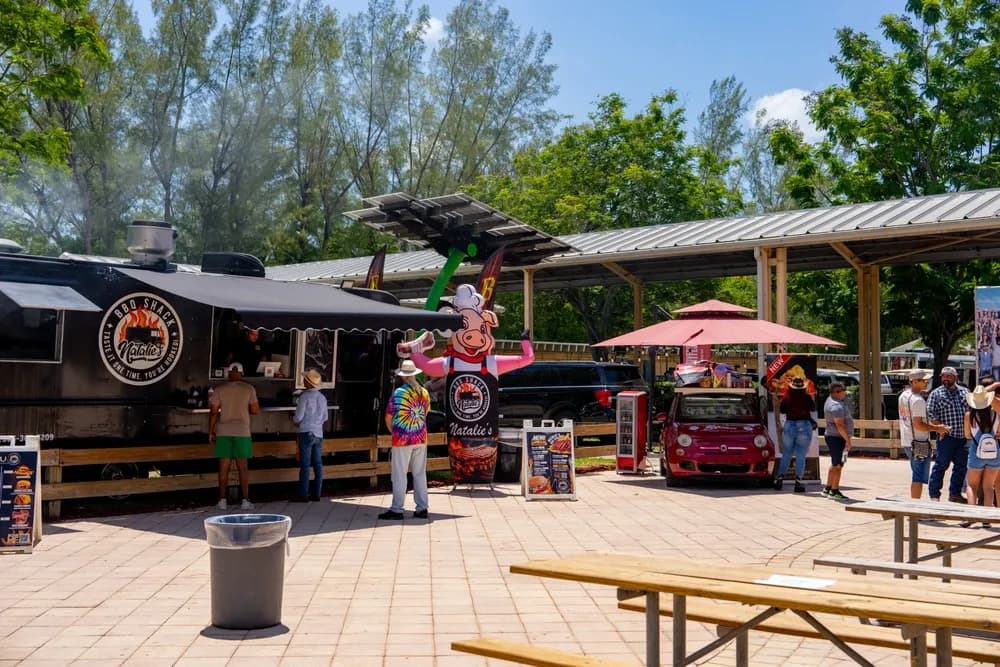
You’ll need to check with the city or county for any regulations on trash disposal, as there might be restrictions on where and when you can drop off waste.
Make sure to research the local waste management services that cater to food trucks in Miami and get familiar with the procedures. It's also essential to ensure that you have enough space on your food truck to store trash throughout the day, as leaving trash on the street is not allowed according to city of Miami legislation.
Step 6: Ensure You Have Access to Electricity and Water
To run a successful food truck, you need a reliable source of electricity and water. Your cooking equipment and refrigeration systems will require power, and in many cases, a generator will be necessary. Some food trucks come with built-in generators, while others may rely on nearby sources, such as outdoor outlets.
When it comes to water, you’ll need it for food preparation, cleaning, and hygiene purposes. Most food trucks are equipped with a water tank and pump system.
However, you’ll need to ensure that your water system complies with Miami’s health regulations.
If you plan to park your food truck in a location that doesn’t offer access to water or electricity, you’ll need to figure out alternatives, such as bringing your own power supply or working out arrangements with nearby businesses.
Step 7: Consider Adding a Dining Area for Your Customers (Optional)
While it’s not a necessity, offering a small dining area for your customers can help improve their experience and increase sales.
Some food trucks set up folding tables and chairs nearby for customers to sit and enjoy their meals. Depending on the size of your truck and available space, this could be a good way to create a more welcoming atmosphere and encourage customers to spend more time and money on your food truck.
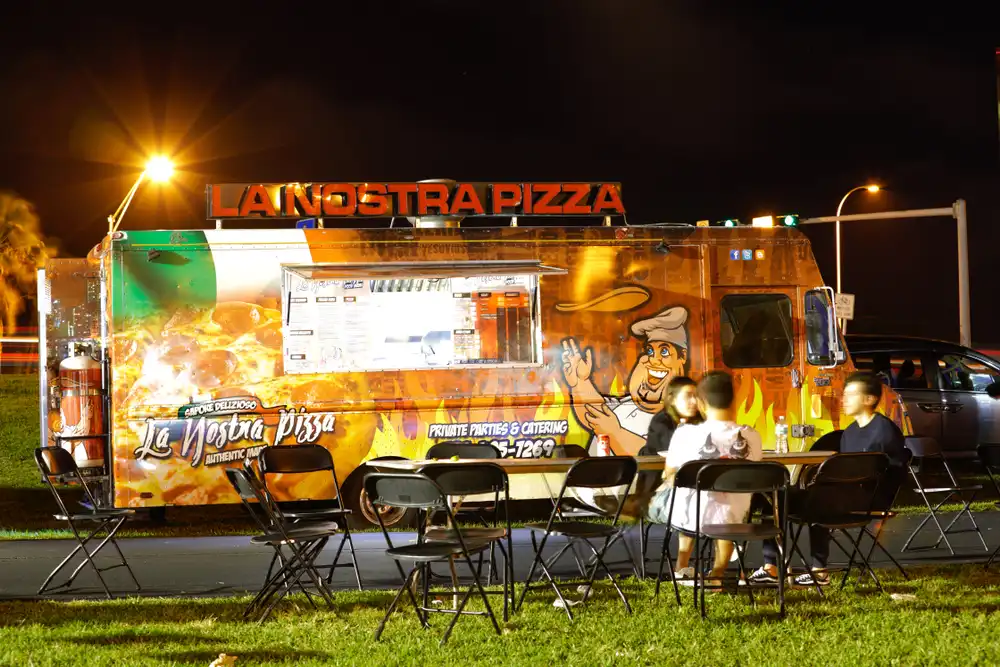
However, adding a seating area does come with extra considerations. You need to make sure that you have enough room in or around your truck to set up the tables and chairs. You’ll also need to ensure that the area is kept clean and safe, and that you comply with local rules for public dining areas.
Additionally, you may want to check with the City of Miami for any zoning or health regulations about dining areas for food trucks.
Where Can I Park My Food Truck in Miami?
Parking your food truck in Miami requires careful attention to local regulations to ensure compliance and avoid fines.
Here's a detailed guide to help you navigate the rules:
Zoning Requirements
Food trucks are permitted to operate in specific zoning districts. According to Miami-Dade County's regulations, mobile operations are allowed in:
✅ BU (Business District)
✅ IU (Industrial District)
✅ Urban Center
✅ Urban Area
✅ GU (Government Use)
Additionally, traveling mobile operations can operate in residential zoning districts if the property is used for specific purposes like a museum, hospital, school, or church, and the property owner has obtained the necessary approvals.
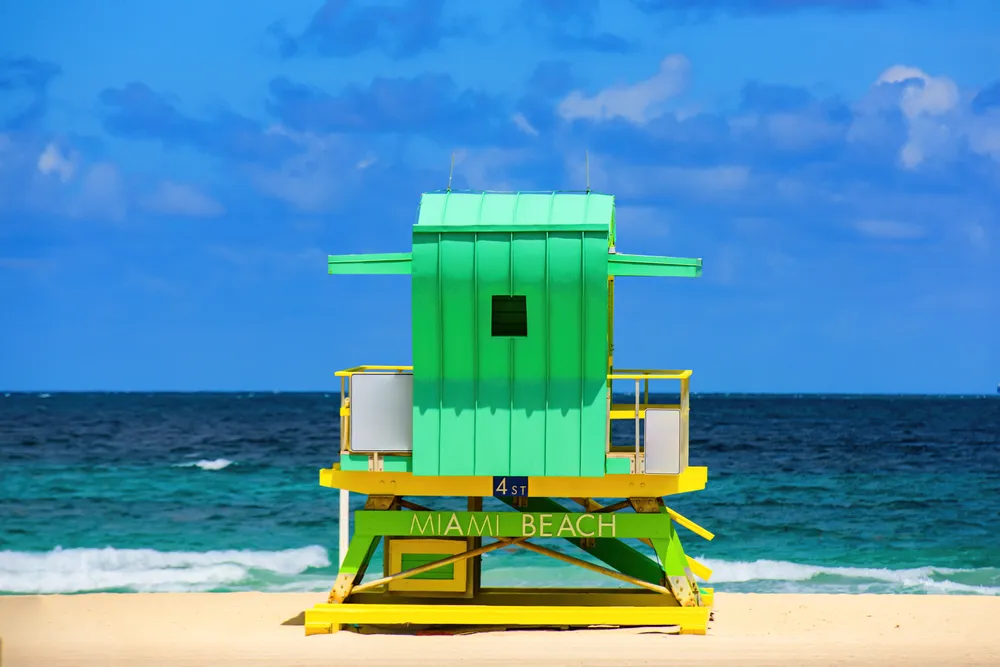
Site Restrictions
When selecting a location, ensure that your food truck complies with the following site restrictions:
⛔️ No Right-of-Way for the Public: Businesses can't be on public roads or streets.
⛔️ No Blockage: Do not park in driveway paths, no-parking zones, loading zones, or parking lines.
⛔️ Distance from Residential Areas: Keep at least 20 feet of space between your food truck and the property line of a residential area, or 10 feet if there is a six-foot-high concrete wall between your food truck and the residential property.
Operating Hours
Food trucks are allowed to operate during the following hours:
⏰ Weekdays: 7:00 AM to 10:00 PM
⏰ Weekends: 7:00 AM to 11:00 PM

Final Thoughts
Starting a food truck in Miami can be a fantastic opportunity, but it’s important to approach the process with careful planning and organization.
From navigating the permits and licenses to finding the perfect parking spots, there’s a lot to manage. Miami offers a dynamic market full of potential, but success comes with preparation. By staying on top of local regulations and understanding your target audience, you can transform your dream of owning a food truck Miami into a thriving business.
With determination and the right approach, your food truck will soon be a go-to spot for hungry locals and tourists alike.

©2025 Cocina Digital Hospitality Group, Inc. All rights reserved.
No part of this publication may be reproduced, stored in a retrieval system, or transmitted in any form or by any means, electronic, mechanical, photocopying, recording, or otherwise, without the prior written permission of the publisher.
We use cookies to enable you to use our site, understand how you use our site, and improve your overall experience.
Cookies allow us to personalize content, track which pages are most popular and least popular, and provide advertising that may be relevant to you.
Please note that cookies that are essential to the proper functioning of the site are required and cannot be disabled.
They are usually only set in response to actions made by you which amount to remembering your settings, a request for services, such as setting your privacy preferences, logging in, or filling in forms.
As such, they are the only cookies that are enabled by default.
You can set your browser to block or alert you about these cookies.
By continuing to use our site, you accept our use of cookies.